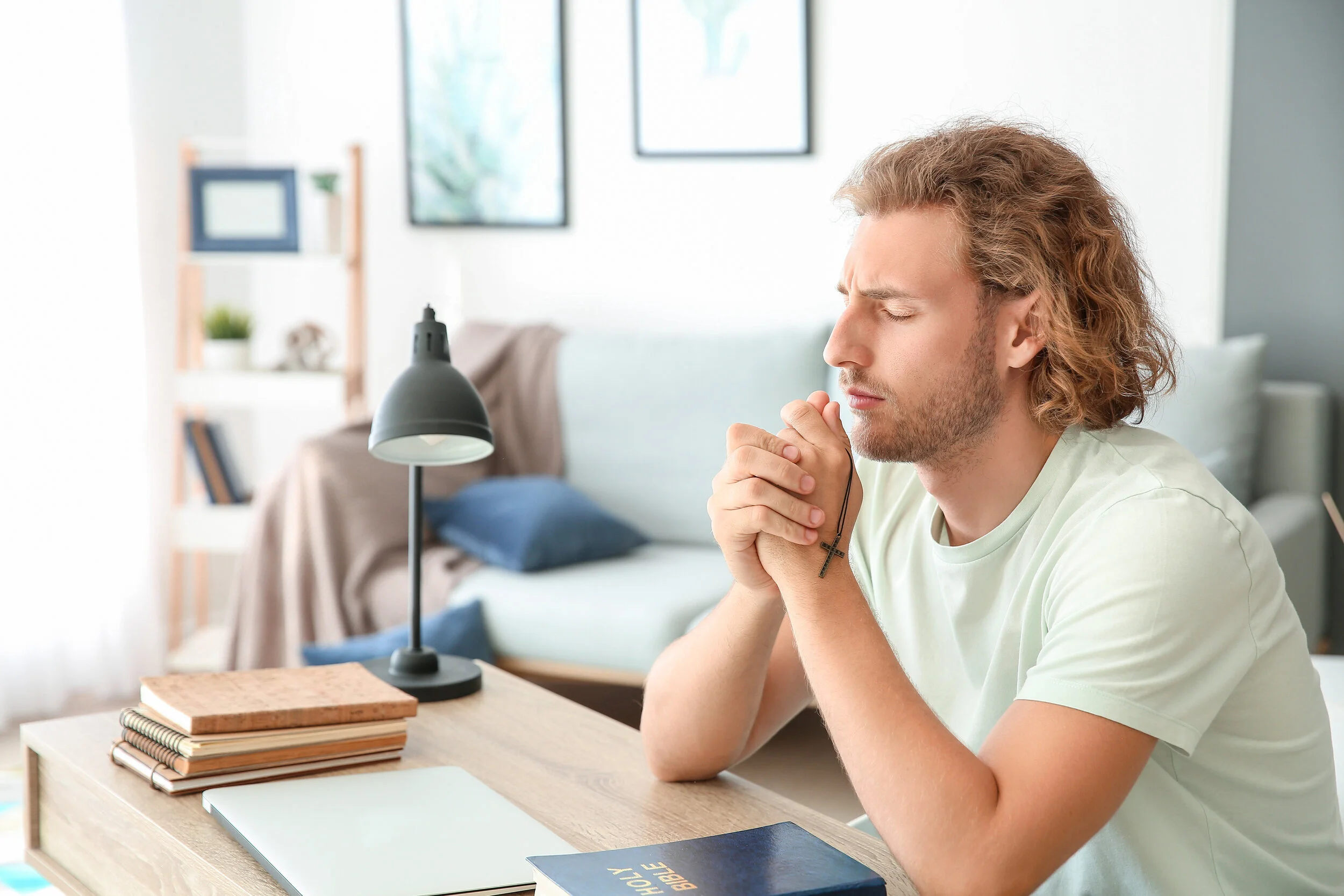Is Anxiety Preventing You From Living Life To Its Fullest
Do you wish you could change your negative thoughts and find inner peace?
Would you describe yourself as a “chronic worrier”?
Do you feel tense and have difficulty falling asleep or staying asleep?
Are you afraid to go out in public for fear of having a panic attack?
When with unfamiliar people, do your feel self-conscious and fear humiliation?
Living with anxiety can be painful and even paralyzing. Worries, problems and fears storm your mind, hijack your thoughts, and try to take them captive. You feel so afraid, preoccupied, and obsessed, but no matter what you do you are unable to rid yourself of these intruders.
You might find yourself engaging in rituals to fend off the intrusive thoughts. You may feel imprisoned in an ever-shrinking world as you isolate yourself from others. Perhaps you chastise yourself because you know your thoughts of fear, dread, or danger are irrational, but you feel powerless to change them. As a believer you may know that you are called to trust in God and take every thought captive to Christ, but this admonition just makes you feel guilty, hopeless and estranged from God.
At its root, fear and anxiety are our God-given capacities for knowing that something bad is going on in the world. The body was created with a built in alarm system which primes us to respond to real or anticipated threats. It’s intended to save our life. When our body’s alarm goes off, we are programmed to respond with fight or flight reaction. But when we have an anxiety disorder, our body’s alarm triggers even in the absence of a credible threat. It is like a home alarm going off every time a spider runs across the floor.
Everyone has anxious thoughts about finances, health or relationships at one point or another. At those times there is a positive type of anxiety that leads you to respond appropriately to these things. It can even cause you to express loving concern for others in the midst of trouble and draw you to take refuge in God (Psalm 94:19; 2 Corinthians 11:28). Then there is a negative kind of anxiety that seems to occur for no serious reason. It often leads to excessive worry, obsessive thoughts, and becomes part of the problem. You are no longer fearful about something wrong in your world but rather you are afraid of the anxiety itself. The alarm has become worse than the fire. This negative kind of anxiety can often lead to anxiety disorders, the most common of which are: social anxiety disorder, specific phobia, social phobia, post-traumatic-stress disorder (PTSD), generalized anxiety disorder, panic attack disorder and obsessive-compulsive disorder (OCD).
Like many people who live with negative anxiety, do you want to break free from the tyranny and live your life to its fullest?
If You Struggle With Anxiety, You Are Not Alone.
Anxiety disorders are the most common type of psychiatric condition in the United States. According to Harvard Health, they affect about 40 million adults each year, almost twice as many people as the roughly 21 million American adults with mood disorders like depression and bipolar disorder.
What causes anxiety? Researchers believe that a combination of things contribute to anxiety disorders. They maintain that your personality is developed through a number of different factors: the way you were raised, your birth order, social and cultural influences, your biological inheritance and the meaning you assign to these things. When these elements combine with life experiences and events, this can foster severe anxiety. These include: being raised in a family where there was alcoholism, a critical parent, rigid values or beliefs or an anxious parental role model. Experiencing trauma or child abuse are also influences. While this list should foster a better understanding of the roots of your anxiety, it might also cause discouragement. You may feel that your past, and the resulting anxiety, will dictate your future. But this does not have to be the case.
Anxiety Treatment Can Bring Lasting Relief!
If feelings of stress, fear and worry have begun to rule your life, take heart. Most forms of anxiety are treatable and recovery is possible. With the help of a compassionate, knowledgeable, competent counselor you can learn to calm your anxious mind and find peace. I can help you experience victory over anxiety and to do so in a biblical, Christ-honoring, gospel-centered way.
I use the biblical counseling approach to anxiety relief. I believe that Scripture speaks to all of life and to all problems including anxiety. In our sessions we will discuss what the Bible says about Jesus, the gospel, and the implications for living without fear and anxiety that proceed from the gospel. I will also work with you to discover and correct ingrained patterns of thought and behaviors that prevent you from overcoming your fears. Moreover, I will help you discover the root causes of your fears, what has gripped your heart, and help you remove them.
Before we deal with your daily fears we must first address life’s ultimate fear: that we have fallen short of God’s perfect standard and as a result, we are unacceptable to God apart from Jesus Christ’s atoning sacrifice. The gospel-centered answer to fear and anxiety is that “there is no fear in love but perfect love drives out fear, because fear has to do with punishment.” We learn that real freedom from fear and anxiety is found in Christ who gives us peace (1 Cor. 15:55-58).
In counseling we will explore your relationship with Christ. We will look at ways your confidence in Christ has been replaced by human fear. You will learn to trust and obey the God who says, “Fear not for I am with you” (Isaiah 41:10). The goal of our counseling is progressive sanctification; it is to become more like Christ.
In counseling I also include forms of DBT (Dialectical Behavior Therapy), including mindfulness and relaxation techniques to calm and mitigate anxiety symptoms. Mindfulness is the practice of focusing attention on what is happening in the present, and accepting it without judgment. I have adapted mindfulness for Christian counseling purposes. Mindfulness is often learned though meditation, a systematic method of regulating one’s attention by focusing on breathing, a phrase or an image. I sometimes use these techniques alone or incorporate Bible verses, such as the 23rd Psalm. I begin by first having you meditate on the passage. We then practice mindfulness as we think about being in a green pasture and by still waters. I have found this to be very helpful in the quest for inner peace.
I also use relaxation techniques to ease anxiety. These include deep (diaphragmatic) breathing, visualization and scanning. Diaphragmatic breathing is a technique that induces relaxation, slows the heartbeat, and lowers or stabilizes blood pressure.
Over the years I have helped many people just like you break the cycle of anxiety. My gentle, compassionate, skillful and Christ-centered approach makes all the difference. In counseling I not only provide symptom relief but I also help my counselees get to the root of the problems. This facilitates long-lasting change.
I have been a committed believer for over 30 years. I have been through some of the most difficult things life has to offer. I have experienced times of anxiety and depression. In these times I have learned to draw close to God and to feel his presence. I have also received God’s abundant grace to persevere and live a rich, fulfilling life. As a counselor I bring life experience, strong counseling skills and excellent training into the counseling room. All this makes me well qualified to help you.
You Might Believe That Therapy Can Help You, But May Still Have Questions.
Isn’t anxiety therapy expensive?
Therapy can be expensive. But if you are overwhelmed with anxiety and do not feel like you can live your life to the fullest, therapy is the best investment you can make. Therapy is a financial commitment that can help relieve your anxiety, give you peace and improve the quality of your life. Are you worth the investment?
To help defer the costs of therapy, I give insurance receipts for you to submit to your health insurance company. Many of my counselees have had success getting reimbursed for a substantial portion of their fees.
I have heard that anxiety counseling takes time
When people come to counseling they often want a quick fix and immediate relief. But deep problems do not have quick solutions. It frequently takes time and patience on the part of the counselee to find healing. However, my approach often takes a matter of weeks or months. I have seen a number of motivated clients, who really wanted to change and grow in Christ, recover quickly.
Isn’t anxiety medication as effective as counseling?
Anxiety medication can be effective in treating anxiety. Yet, I rarely recommend medication as the first course of action because of the side effects. Medication can also alleviate symptoms without affecting the causes we are trying to identify and permanently remove. When anxiety is severe, however, we sometimes need to still the waters with medication before we can work on the underlying issues. In these cases I would recommend that you consult a doctor regarding medication.
It’s Time To Stop Letting Anxiety Control Your Life.
I understand that making the decision to move forward with therapy can be a difficult one. It is especially hard when you suffer with anxiety. Please try to summon the courage to move forward. It will be worth it. I have helped people just like you find lasting relief from their anxiety. Call me at 1-973-464-2759 for a free 15-minute consultation.








Most people with anxiety disorders also have trouble sleeping. That’s a problem. Chronic loss of sleep can increase anxiety symptoms and interfere with your health, relationships, and overall ability to function effectively in life.